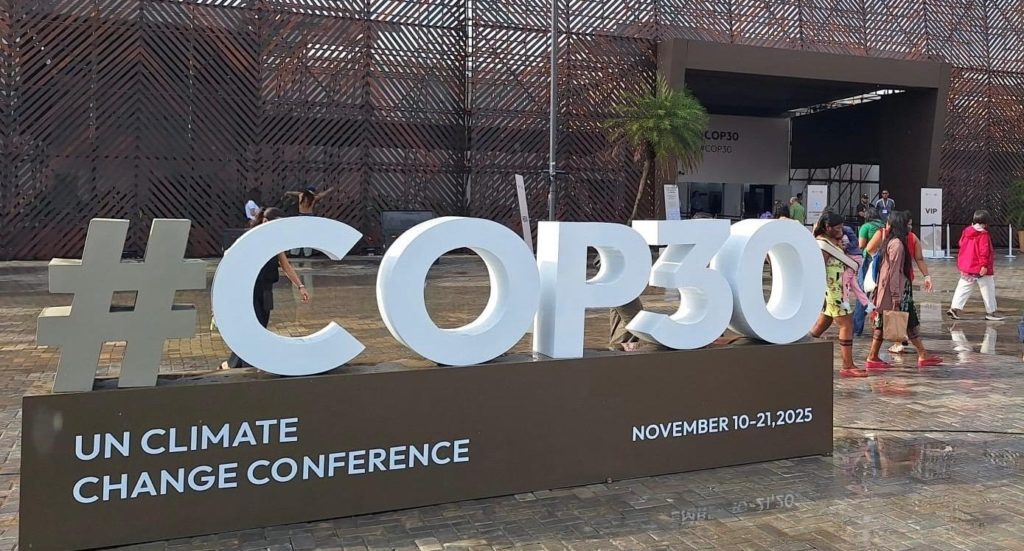Exeter experts give COP30 verdict

University of Exeter experts have given their verdict after the conclusion of the COP30 climate conference.
The University played a significant role at COP30, which was held in Belem, Brazil.
The conference ended with news that a key deal called the “Global Mutirão” had been agreed – but with no pathway on fossil fuel cuts.
Here’s what Exeter experts have to say:
Dr James Dyke, Assistant Director of Exeter’s Global Systems Institute, said: “COP30 comes 10 years after COP21’s achievement of the Paris Agreement, and its objective to limit warming to well below 2°C. For the Paris Agreement to have had any chance of success, governments – particularly those in rich, industrialised nations – would have needed to accelerate the phase out of fossil fuels at the same time of phasing in the financial support for energy transitions in the Global South. Neither have happened. In 2024, industrial processes poured a record-breaking 37.4 billion tons of carbon dioxide into the atmosphere, while the amount of climate finance thus far promised is a fraction of what is needed. Despite the host’s best efforts, COP30 will not even be able to get nations to agree to fossil fuel phase out. This shameful outcome is the result of narrow self-interest and cynical politicking.”
Dr Martina Egedusevic, Impact Fellow at Green Futures Solutions, said: “COP30 will be remembered as the moment global leadership simply evaporated. At a time when extreme heat, catastrophic floods and wildfires are setting new records every year, negotiators still could not summon the basic courage to stand up to fossil-fuel interests. This is not a diplomatic setback. It is climate malpractice. Wealthy nations and petrostates have knowingly chosen political convenience over planetary survival, allowing the crisis to accelerate while pretending their watered-down commitments are progress. History will not be kind to those who had the power to act and instead chose delay, denial and self-preservation.”
Dr Steve Smith, a co-author of the Global Tipping Points Report, said: “Before the COP process kicked off in Berlin 30 years ago, climate scientists already knew that a safe operating space for humanity depended on us rapidly transitioning away from fossil fuels – we needed to lower greenhouse gas emissions at least 60% by the 2020s. Instead, 30 COPs later, we’ve increased emissions by 60%. So, it would be easy to say the COP process has failed, forgetting how much worse things might have been without it. At COP 21, countries came together to agree to limit global warming to below 2oC, preferably 1.5oC. At COP 28, countries agreed to transition away from fossil fuels. Now, over 140 countries and sub-national governments covering over 90% of the world’s economies have carbon net zero targets. The rate of growth of emissions is slowing down, from 2% per year down to 0.6%. Emissions of the world’s worst polluters have peaked. A clean tech revolution is set to transform the world. This year, growth in solar and wind for electricity generation surpassed the total growth in electricity demand, which means fossil-fuelled electricity generation is now in structural decline. It is beyond disgraceful that a few countries could veto in the overall ‘cover decision’, the ‘Global Mutirão’, on the need to ‘transition away from fossil fuel’. But the battle to reach a final compromise text at Belem is not where the real war is being waged. This is between the world’s two economic giants, the USA and China, who are going all in on opposite energy futures, and not just for themselves. Both countries have ambitions to be the energy supplier to emerging countries and are building enormous energy exporting capacities – China with solar panels and batteries, and the USA with Liquid Natural Gas (LNG). As Ember’s Sam Butler-Sloss and Kingsmill Bond persuasively argue, China looks to have the winning hand as solar power continues to race ahead as the cheapest, fastest to deploy, and most versatile energy source in human history. For the three-quarters of the world that imports fossil fuels, renewable energy electrification is also the path to energy independence and security.”
Dr Marcos Oliveira, Research Impact Fellow in the Nature & Climate Impact Team, said:”COP30 marked significant progress in the global governance of information integrity. For the first time in the history of COP, the topic of information integrity was formally included in the official agenda, with two dedicated thematic days. The COP30 Presidency also appointed a Special Envoy for Information Integrity, underscoring the strategic relevance of the topic. One of the main outcomes was the mobilisation of a Global Initiative for Information Integrity on Climate Change, accompanied by the launch of the ‘Declaration on Information Integrity on Climate Change’ on Wednesday, 12 November. By endorsing the declaration, countries committed to implementing strategies aimed at addressing climate misinformation, strengthening information ecosystems, and promoting the dissemination of accurate and reliable climate-related knowledge.”
Professor Richard Betts MBE, Head of Climate Impacts Research at the Met Office Hadley Centre, and Chair in Climate Impacts at the University, said: “Holding this COP in the Amazon put the ongoing threat to tropical forests in the spotlight. With global warming set to exceed 1.5oC in the next few years, forests will play a vital role as carbon sinks to help limit the extent of further warming and potentially reverse it in the long term. Continuing to study and protect them will be crucial.”
Dr Sally Flint said: “It was encouraging this year to see a culture and heritage day at COP30, and, in recognition, ‘We Are the Possible – Planet Forest – 12 Poems for 12 Days of COP30‘ being included at various events by the British Council, Met Office, and the University of Exeter across the conference. Our methodology, devised and grown over 10 years, brings disciplines together to share writing, stories, conversations and research, and to weave them into this new anthology alongside positive climate actions happening around the world. It demonstrates that when scientists, educators, health experts, youth leaders, students, translators, culture and arts are given a space to co-create new narratives, these can, in turn, impact policy makers and the public by showing what’s happening in the world, the urgent need to take climate action and how imagining a more sustainable world can make it happen. That it is possible to protect and repair planetary health and ecosystems. Thanks to Professor Richard Betts for reading the poem, ‘Cloud Forest’, from the anthology which questions carbon footprints, consumerism, capitalism and forests – which maybe the first time a climate scientist has read a poem at a COP conference!”
Dr Jesse Abrams, Senior Impact Fellow at Green Futures Solutions, said: “The removal of fossil fuel transition language from the COP30 draft represents a concerning reversal of the limited progress made at COP28. This backsliding comes at precisely the moment when our understanding of climate risks shows we have less room for delay than previously thought. We’re already seeing floods, droughts, and extreme events intensifying globally, while systemic threats from potential tipping points in Earth systems loom larger. Current risk assessments systematically underestimate these dangers by failing to account for how climate impacts cascade through economic networks and can trigger irreversible changes in systems like ocean circulation. As geopolitical fragmentation intensifies, particularly with shifts in US climate leadership, we’re likely to see climate action increasingly driven by coalitions of willing nations and industries rather than unified global frameworks. This diplomatic deadlock doesn’t pause the physical climate system. Each year of continued fossil fuel dependence locks in greater exposure to extreme events while increasing the probability of crossing irreversible thresholds – with profound implications for global security and economic stability.”
Professor Ian Bateman, Co-Director of the Land, Environment, Economics and Policy Institute (LEEP) at the University of Exeter Business School, said: “It’s pretty easy to tell a story describing the COP process as a failure. But the counterfactual – what would have happened without COP? – is always difficult to see. Worldwide actions undertaken over the past three decades that COP has been operating have reduced predictions of an increase in global temperatures by 4-5C by the end of the century to below 3C. This is still enough to cause massive damages – but it gives hope for the future. While COP has been an important piece in shaping the process, it is action around the world that will deliver a sustainable climate. And this brings us back home – to the forthcoming UK Budget. HM Treasury have described proposals to match fuel duty on diesel and petrol with an equivalent tax on electric vehicles (EVs) as “a fairer system”. It is patently not. Diesel and petrol cars emit both greenhouse gases and the particulates and other forms of air pollution which are one of the major causes of premature death in the UK; EVs do not. Taxing EVs will deter drivers from leaving their pollution emitting cars, slowing down the Government’s own efforts to address climate change and improve the health of the nation. Taxing EVs makes no sense.”
Exeter alumnus James Lewis, Vice President of Conservation at Rainforest Trust, said: “The message from COP was unmistakable: we continue to underfund and undervalue nature and the people on the frontlines protecting it. Sadly, this remains a global reflection of our collective priorities. The growing focus on large-scale blended finance is encouraging, but the reality is that limited resources still force a triage approach to conservation. And yet, what works is not in doubt: securing land rights for Indigenous peoples and expanding protected and conserved areas consistently deliver the strongest, most durable outcomes for nature and communities. As COP closes and 2030 approaches, along with the global pledge to safeguard 30% of the world’s oceans, freshwater, and terrestrial environments, the question is whether we will finally invest at a scale that matches the urgency.”



